What's never clear in these sorts of articles is if there was any reduction in salaries, or increase in working hours. Like are people going from working 40 hours a week to 32 with no change to their paycheck? Or are they getting paid 20% less? Or are they still working 40 hours, just over 4 days instead of 5?
Canada
What's going on Canada?
Communities
🍁 Meta
🗺️ Provinces / Territories
- Alberta
- British Columbia
- Manitoba
- New Brunswick
- Newfoundland and Labrador
- Northwest Territories
- Nova Scotia
- Nunavut
- Ontario
- Prince Edward Island
- Quebec
- Saskatchewan
- Yukon
🏙️ Cities / Local Communities
- Calgary (AB)
- Edmonton (AB)
- Greater Sudbury (ON)
- Halifax (NS)
- Hamilton (ON)
- Kootenays (BC)
- London (ON)
- Mississauga (ON)
- Montreal (QC)
- Nanaimo (BC)
- Oceanside (BC)
- Ottawa (ON)
- Port Alberni (BC)
- Regina (SK)
- Saskatoon (SK)
- Thunder Bay (ON)
- Toronto (ON)
- Vancouver (BC)
- Vancouver Island (BC)
- Victoria (BC)
- Waterloo (ON)
- Winnipeg (MB)
🏒 Sports
Hockey
- List of All Teams: Post on /c/hockey
- General Community: /c/Hockey
- Calgary Flames
- Edmonton Oilers
- Montréal Canadiens
- Ottawa Senators
- Toronto Maple Leafs
- Vancouver Canucks
- Winnipeg Jets
Football (NFL)
- List of All Teams:
unknown
Football (CFL)
- List of All Teams:
unknown
Baseball
- List of All Teams:
unknown - Toronto Blue Jays
Basketball
- List of All Teams:
unknown - Toronto Raptors
Soccer
- List of All Teams:
unknown - General Community: /c/CanadaSoccer
- Toronto FC
💻 Universities
💵 Finance / Shopping
- Personal Finance Canada
- BAPCSalesCanada
- Canadian Investor
- Buy Canadian
- Quebec Finance
- Churning Canada
🗣️ Politics
- Canada Politics
- General:
- By Province:
🍁 Social and Culture
Rules
Reminder that the rules for lemmy.ca also apply here. See the sidebar on the homepage:
The 4 day work week is based on the idea that people are more productive with less time to goof off. Work 32 hours for the same pay and you should see the same or better outcomes. So likely the case is yes
I know that's the idea, but I can't imagine a lot of companies being eager to effectively pay their employees the same for 20% "less work". I know it's a good idea, I just have no confidence in companies. Just look how many of them forced people back to offices during the pandemic despite the safety, cost, and productivity benefits of working from home.
Not 20% less work, 20% less time.
Again, I agree. I just don't think suits will see it that way
Call it a KPI, trend it up. Boom suit support
They are doing more work in less time (and are happier) the tests show.
I agree, but that is true for working remotely as well, and look how few companies still offer that now. Most companies don't like to make changes that make their employees lives better, even if there is no downside.

I'm just guessing based on what I've seen elsewhere, but I think it's fewer hours with same pay. I don't think the pay could be less or people wouldn't want to stay with the company, as mentioned in the article.
My employer was not part of this trial but has been doing this since Spring 2022. There's been no increase in hours/workday or decrease in salary (and in fact, I got a raise---I think most people got at least a COLA).
We ran our own trial and the results are honestly even more positive than I would've thought myself.
If some companiea can offer fulltime or hybrid WFH to have an advantage in getting employees, some others will.offer 4 day workweeks to be competitive with other companies. Canada can start the trend.
It would help if the governments did it... but I can't see them being a leader on this one because of the optics.
Government treats public servants like shit because it's popular to do so. Nobody wants to believe their tax dollars are going toward somebody having a good job when they themselves don't have a good job.
Crabs in a bucket.
Most people fucking suck.
I wish I were that hopeful but I dunno I don't really see it starting. I'd love to be wrong though.
Is this
- cheesy 4-day weeks where it's 4 days x 10 hours; or
- real 4-day weeks where it's 32 hours a week and no reduction in pay or production?
I'm gonna read the article now, but I'm really expecting to be disappointed. 4-day workweek isn't about job-sharing; it's about realizing the same output with longer weekends and everyone getting the same pay for the same output.
Article unfortunately doesn't specify.
Any list of companies? I would send in a resume. Especially if they are also fully remote.
My boss just mentioned 4 day work weeks.. with the same amount of hours, I said that the idea is less hours, not the same hours crammed into less days and he absolutely refused that that is what people mean with 4 day work weeks..
I've been discussing this, lightly, on and off for a couple of years know, and most workers can't wrap their head around the idea, either.
"They'll never do that for us," says the class the owners are completely and totally dependent on.
Your boss is dumb as a bucket of rocks.
You're, uh, replying to the wrong person.
To be fair, that statement has fairly broad applicability
To be fair to your employer, he may have conflated two different kinds of 4-day work weeks.
The current discussions are mostly about 32-hour weeks, but there is a very long history of what labour law calls the "modified work week" in which the number of hours per day or days without breaks are changed to allow for alternate scheduling without triggering overtime. I've worked 4-10s, 8 on 6 off, and other oddities since I entered the work force in the early 1970s.
The most common of those is 4-10s, and it's always been known by that name (4-10s) or 4-day week, or "4 and 3", with "4-day week" being the most common in my experience.
I know that my own following of this issue makes it clear that there are a lot of people confusing the two different kinds of 4-day weeks.
Yeah... it's definitely gonna take some time to get employers on board.
Sanity reigns north of the US. Too bad trickle down doesn’t work, in any form.
This works for many businesses, but sadly cannot work for certain industries like manufacturing, steel making, petroleum refining. etc. These are 24/7, 365 operations and running less than that actually costs them money. However, you're usually well compensated in these industries in my experience
That's why they have shift workers. Reduce the shift hours to be the same as a 4 day week. Its not hard
But then you need to hire more staff. I think part of the sell is that it's no more cost for the employer, since workers get more done in less time. That might not be true for many operational jobs.
It could also lead to better productivity and less turn over with employees which would be a net positive in the end. When I did labour jobs 2 days off was not enough for me to recover, 3 days off would have been better for my body and mental health and maybe I would've stuck around longer.
And these were the same excuses used when we went to 40 hours a week and the world kept on turning.
The issue is that these sorts of fields are notorious for not liking to hire more than they have to. They'd rather overwork their existing staff than hire more.
I knew a guy who worked as a machinist, and basically everybody in his company worked 60+ hours every week all year, and the company compensated proper overtime the entire time. The company basically paid double wages for 50% extra labour, and that's presuming that the employees even did 50% extra work for being tired all the time. The guy quit the job because he couldn't take it after a few years, so in the end the company had to hire more help anyways.
It's an issue of culture as well as many other things, and few people want to go against tradition.
We tried to bargain 4 day work weeks years ago at a place I worked, and it was a scheduling nightmare.
Objectively, since we needed to have doors open and responders/equipment operators on site 5 days a week, it would have meant hiring something like 30% more people.
Non-ojectively, when management brought these concerns forward, our position was "that's a management problem".
Summary of the actual report. You can download it for the price of your email address.
The report presented by 4 Day Week Global evaluates the impacts of a reduced four-day work week over a span of one year. Key findings are as follows:
Employee working hours reduced closer to a target of 32 hours a week after a year, and they were found to work more efficiently. While burnout levels slightly increased after the six-month trial, overall improvement was sustained. Physical and mental health scores, life satisfaction, and work-life balance all improved from the beginning of the trial to 12 months after. Job satisfaction saw a slight regression after 12 months but still remained higher than before the trial. The overall experience of the 4-day week was highly positive with a 9/10 rating, suggesting that reduced work time benefits can be sustained long-term. The report also includes data from businesses in the US, Canada, the UK, and Ireland. The program's design allowed companies to adopt the 4-day week without a specific model, as long as pay was maintained at 100% and employees saw a significant reduction in work time. Notably, none of the participating companies desired to return to a five-day week post-trial.
Additionally, the report indicates improved environmental outcomes, with a 42% increase in employees performing more environmentally friendly activities. Overall, the founders of 4 Day Week Global express enthusiasm for these positive results and the potential widespread adoption of a 4-day work week.
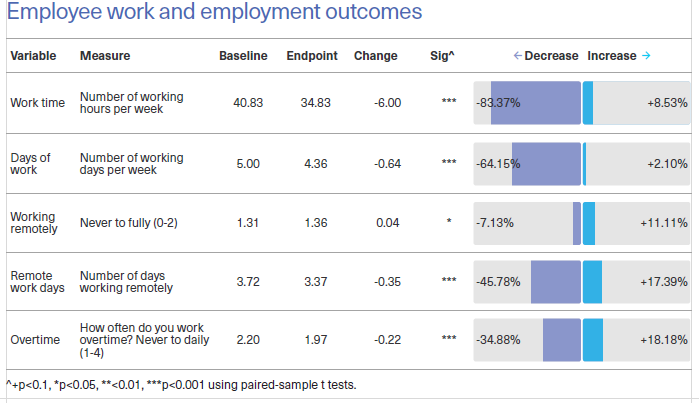

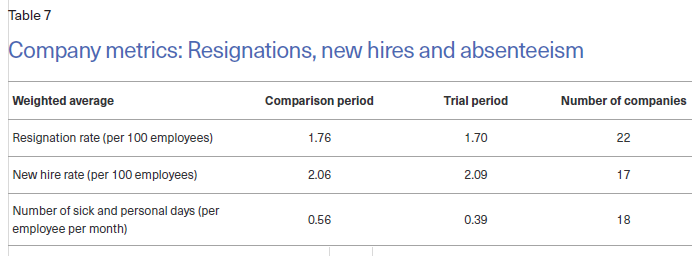


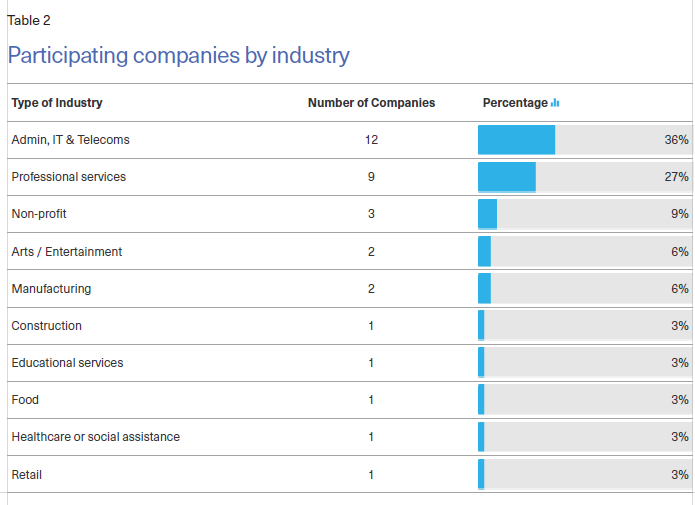
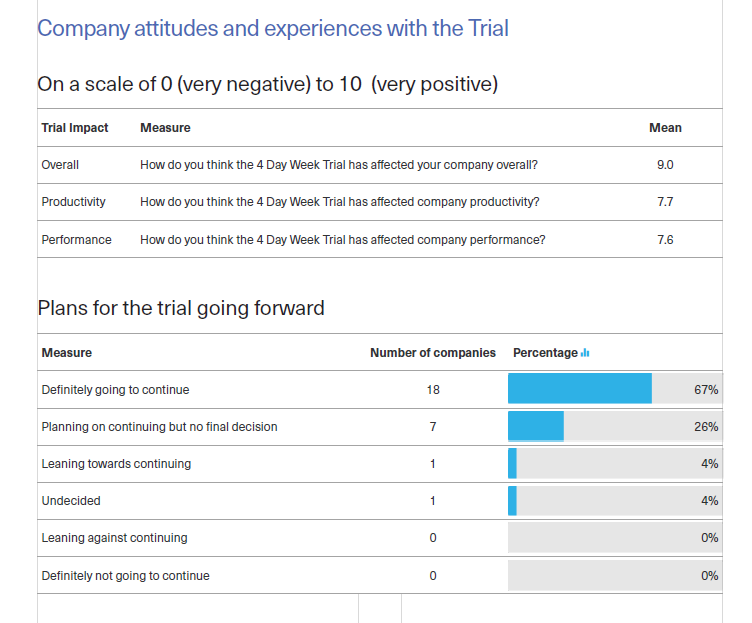
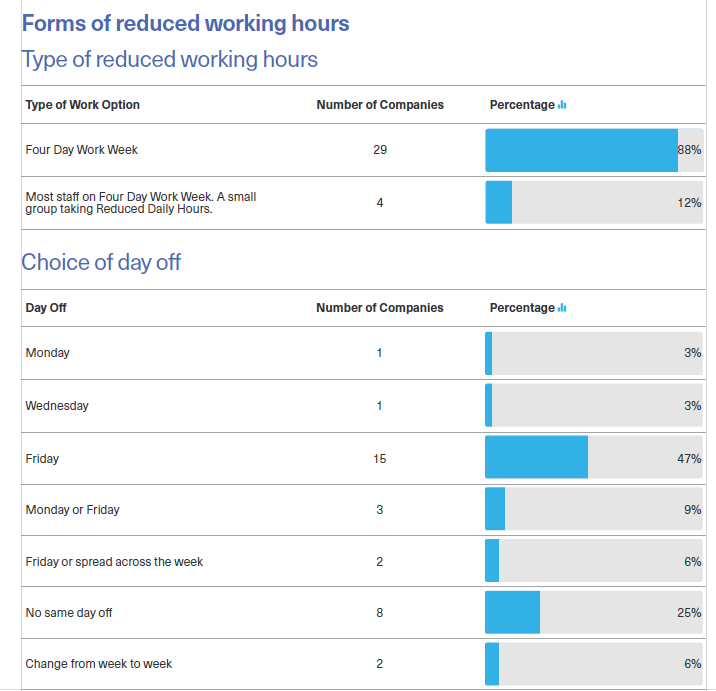
Thank you for this excellent summary. It answers all the questions I had, and it's wonderful news.
Office workers aren't very productive in general. We should focus on greater automation.
I'm an office worker. I work on automation.
Where's that leave me? Who automates the automaters?
Also, from the office work I've seen, and compared against WFH, I'd agree to SOME reduced productivity - like 20% - but which is regained by allowing experienced people clear work time without interruption (which we get in remote work). The other 80% may actually be difficult to automate as trivially as required for any gains here.
It literally benefits everyone.
How many hours each day do people take to "wake up" and get going? I'd argue people are mostly useless up until close to lunch time. Then, people wind down when the day end is nearing, meaning companies are losing more productive hours each week.
I also would prefer to do longer days if I already dragged my ass out of bed. I don't run for errands daily to make them shorter. I pile them up, then take 4-5 hours one day, vs 1 hour each day. I am already out doing it, might as well do them all, and have more time to relax at home other days.
